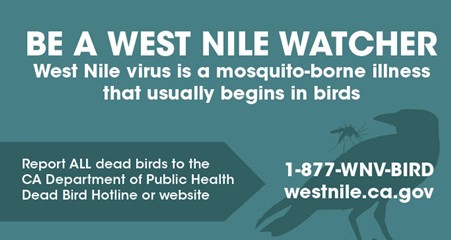
BE A WEST NILE WATCHER
Reduce the Risk of West Nile Virus–Be on the Lookout for Mosquitoes and Dead Birds
First come the hot days of summer, then the warm summer nights soon follow–and those warm nights actually increase the risk of West Nile virus (WNV). That’s why it’s more important than ever to dump standing water to prevent mosquitoes because it’s not a matter of if, but when WNV shows up again in Contra Costa County.
According to the Contra Costa Mosquito & Vector Control District, once overnight temperatures maintain 56 degrees or above for a week or longer, WNV is able to reproduce efficiently within the mosquito population, increasing the risk that people could become infected.
To reduce that risk, be a West Nile Watcher.
Look for places where mosquitoes could develop and take action.
On your own property:
- Dump out standing water, particularly water under potted plants, in cans, buckets and other containers.
- Clean out fountains and bird baths every two or three days because mosquitoes can develop from egg to adult in as little as five days.
- Chlorinate and filter swimming pools and spas.
- Pick up mosquitofish from the District for decorative ponds. There is no charge for these fish that will eat mosquito larvae in the water.
- For swimming pools, spas and other water features that are no longer in working order, pick up mosquitofish from the District to use until you are able to take permanent action to prevent mosquito development in the water feature.
- Report mosquito activity observed in a public place, such as a park or garden store to the District.
Report Dead Birds
WNV is a virus that is carried by birds. Crows and jays, members of the Corvid family, are species of birds that are particularly susceptible. Mosquitoes that bite infected birds can also become infected. Once infected, a mosquito can spread WNV to you or your family through a single mosquito bite.
To reduce the risk of WNV transmission to people, report dead birds as soon as you see one, no matter where you see one. Your report helps the District direct surveillance and control efforts to reduce the risk of WNV transmission to Contra Costa County residents.
Not all birds can be picked up for testing, but ALL reports are very important because they help the District to identify and reduce the risk of West Nile virus for you and your family.


from the CDC website: ” Can I get West Nile virus directly from birds?
There is no evidence that a person can get infected from handling live or dead infected birds. However, you should avoid bare-handed contact when handling any dead animal. If you must pick up a dead bird, use gloves or an inverted plastic bag to place the bird’s carcass (body) in a garbage bag.” // https://www.cdc.gov/westnile/dead-birds/index.html
I would suggest you double bag…
I like to watch….boy oh boy do I like to watch things….let me get my lazyboy–brb
The dead bird reporting process is too time-consuming.
agreed